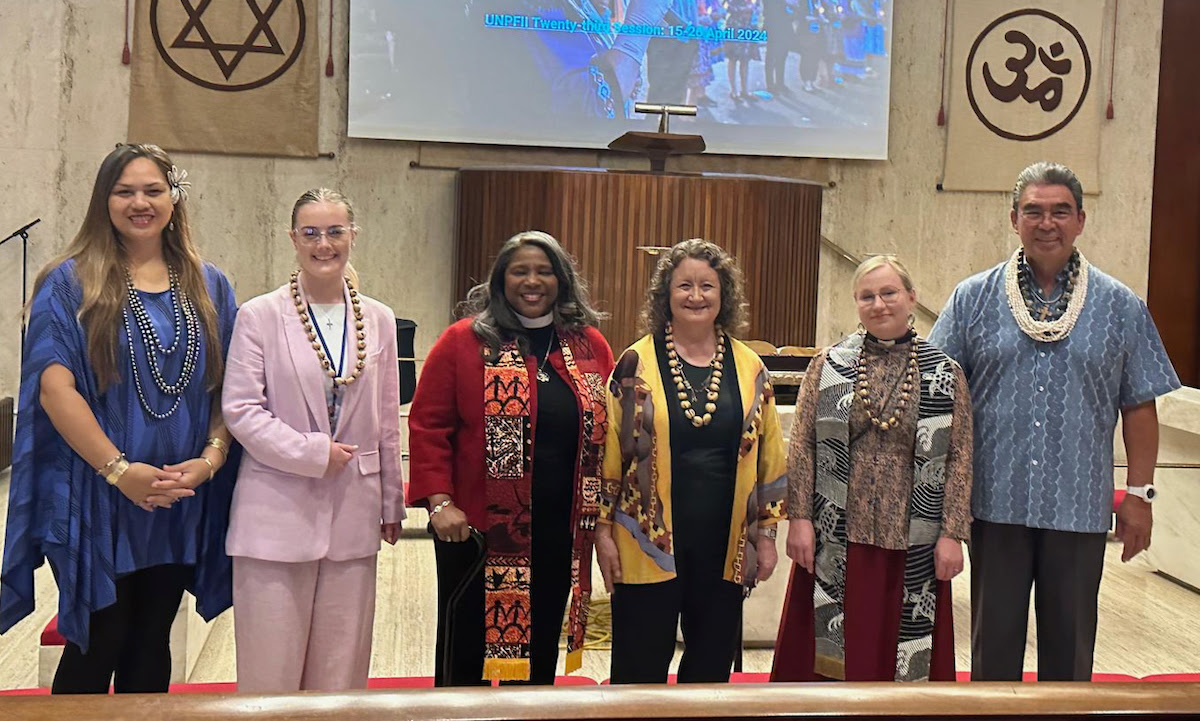Expressing concerns
Delegates spent four days attending the forum sessions for purposes of orienting themselves to the work of the forum. It had been five years since the WCC sent a delegate to the forum so this marked a first step for the newly-constituted reference group to re-engage with the forum.
As youth voices were a featured theme of the session, many young Indigenous peoples addressed the forum to speak to work that is still needed.
A repeated concern was that the issues being brought forward were the same ones brought forward year after year as there has been little concrete action on them.
The most prominent theme of all speakers, young and old, was the need to support Indigenous peoples’ land rights, and the need to protect Indigenous land defenders, many of whom continue to experience significant violence as they seek to defend their territories and peoples.
The WCC delegation attended a commemoration the tenth anniversary of the adoption of the outcome document of the World Conference on Indigenous Peoples.
Delegates also took part in several side events on topics such as Indigenous spirituality; Indigenous identity fraud; and efforts to enhance Indigenous participation at the UN, including in the General Assembly.
An Indigenous spirituality side event featured Indigenous art, music, dance, and food and engaged the audience in meaningful ways.
Showing solidarity
The delegation also participated in a side event about Indigenous languages, as well as two days participating in a consultation with Indigenous peoples from North and South America organized by the World Communion of Reformed Churches.
This included attending a World Communion of Reformed Churches-led worship service at the UN Church Centre, again facilitated by WCC Ecumenical Office to the United Nations.
Rev. Mari Valjakka, moderator of the WCC Ecumenical Indigenous Peoples Network Reference Group, commented, “Christian churches and other faith communities have many Indigenous members around the globe. I think that the world's largest gathering for Indigenous Peoples is a good place for us to network; share experiences; show solidarity to other Indigenous peoples, who are often silenced by those in power; and strengthen the voice of Indigenous peoples by gathering together.”
Juan Chavez, from Bolivia, an anthropology PhD candidate at the University of California, Riverside, is a member of the WCC reference group. He reflected that the forum provides a valuable opportunity to gain insights into the work other institutions are doing.
“Obtaining a US visa and ensuring safety for land defenders who face potential retaliation for speaking out against injustice at home remain ongoing challenges,” he said. “The forum provides a platform to share and discuss ongoing challenges, even for issues that haven't seen recent drastic changes.”
The forum also offers a unique platform to connect with fellow Indigenous peoples worldwide, learn their stories, and understand the struggles they face, added Chavez. “While colonialism and nation-building projects present similar challenges for most indigenous people, the ways these challenges manifest can vary greatly.”
Chavez also reflected that the forum brings together participants with diverse backgrounds, lived experiences, and institutional affiliations. “This richness can make grasping the nuances of complex issues challenging,” he said. “A lack of understanding, in turn, can hinder efforts to support causes and reconcile differing perspectives.”
He added that the forum recognizes the importance of both multilateral and bilateral dialogue. “While it provides a platform for sharing stories and perspectives globally, complex issues often require more targeted discussion,” he said. “Supporting Indigenous communities on a case-by-case basis can pave the way for fostering essential dialogue between state officials and Indigenous leaders, ultimately aiming to find solutions to specific challenges.”
"WCC brings insights to UN Permanent Forum on Indigenous Peoples" (WCC news release, 16 April 2024)
Photo gallery
"Prayer service - United Nations Permanent Forum on Indigenous Issues"
Learn more about the WCC Ecumenical Indigenous Peoples Network
Learn more about the WCC Ecumenical Office to the United Nations

No comments:
Post a Comment